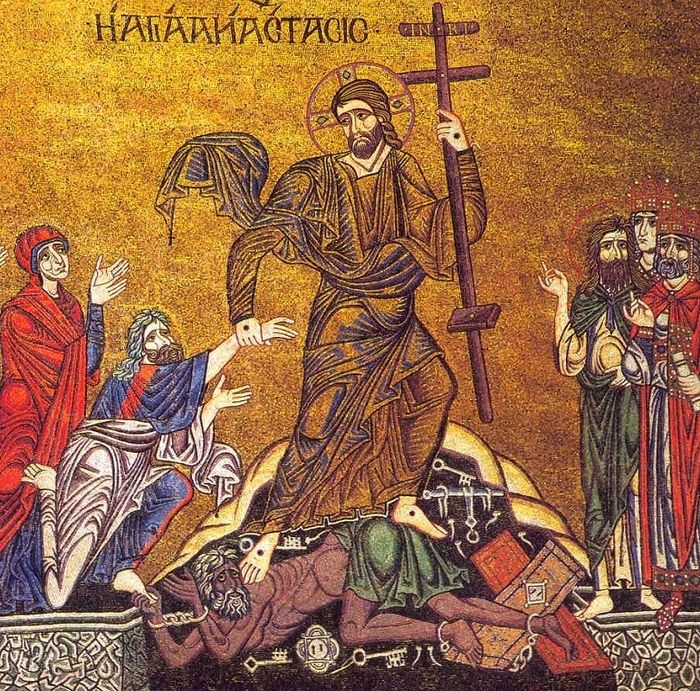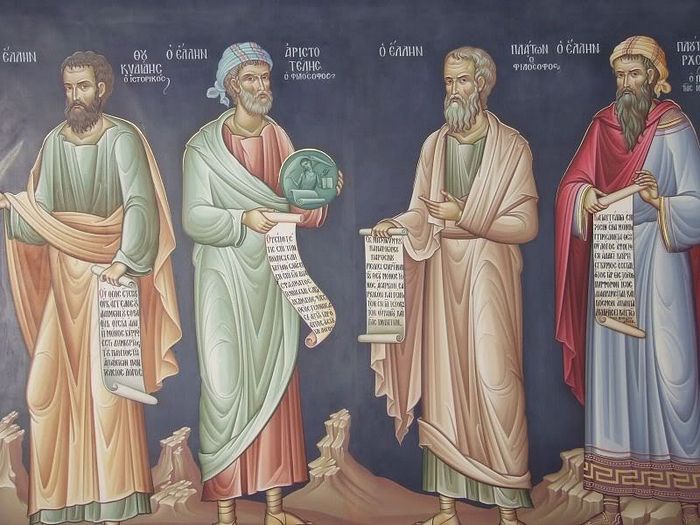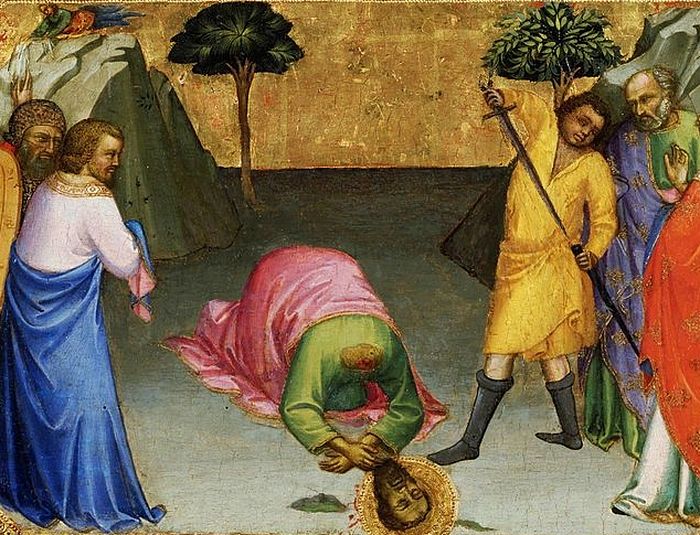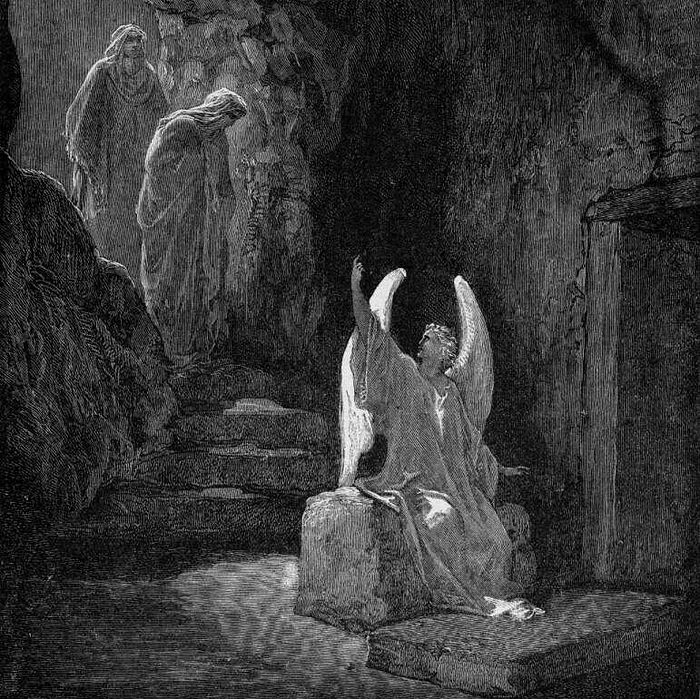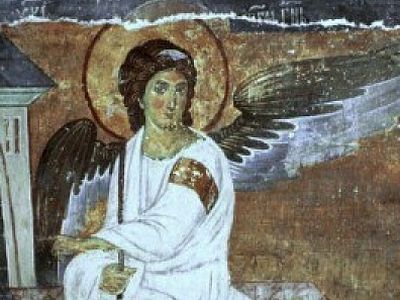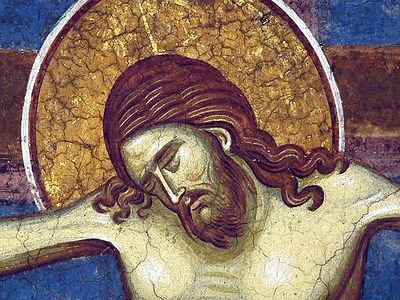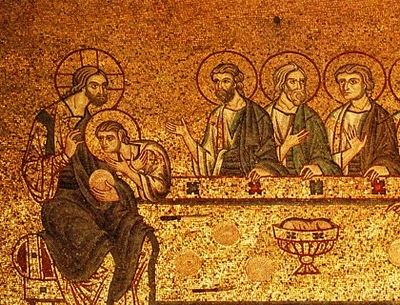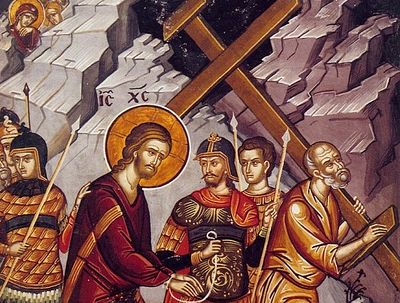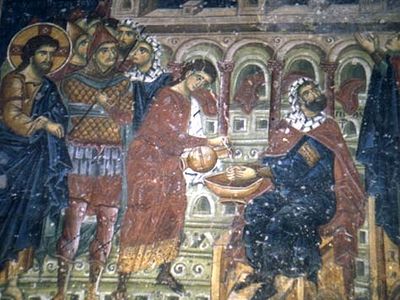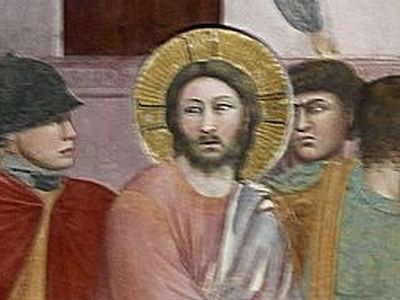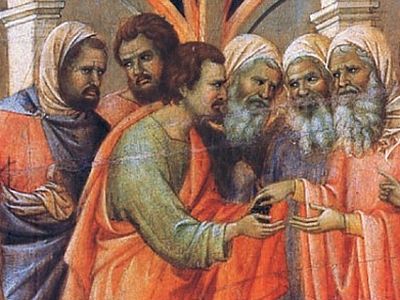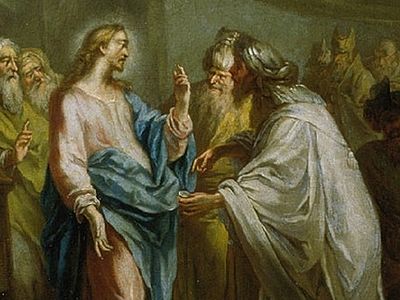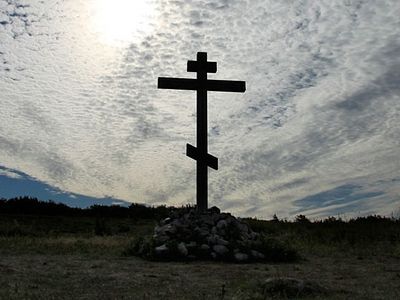Christos Anesti! Christ is Risen!
We’re about to begin a very short series of podcasts on the Resurrection, and I would like to use the traditional prayer of the Church for this season, which is actually the festal hymn, the apolytikion of the Resurrection, which is also spoken as a prayer at this time of year.
Christ is Risen from the dead, trampling down death by death, and upon those in the tombs bestowing life. Amen.
This is a very ancient prayer, by the way. The melody is much more recent than the words and it doesn’t matter which melody you sing, whether it’s Romanian or Greek or Arabic or Russian, the melody is much more recent. I had the opportunity once to discuss this hymn with a very famous expert on Byzantine music. He told me that the words go back to about the fourth or fifth century at least; so the content of the hymn itself is very ancient, but the melodies are more recent. Of course, we don’t know how exactly it was sung in the very early Church. The melody differs depending upon your tradition, but the words never differ.
After so many lessons on the Trials and the Crucifixion of Christ, at last we have the opportunity to discuss the Resurrection. I am addressing the Resurrection because it’s so important; and especially as Orthodox Christians we never talk about the Crucifixion without talking about the Resurrection, too. I won’t be doing a complete exegesis of any passages, and I’m not exactly sure how many podcasts I will use to address these subjects, but I do think it’s important that we talk about our belief in the Resurrection and whether there is any evidence of the Resurrection. We should talk about why God does not give us proofs of the Resurrection, or even of His existence. What about the meaning of the language that we typically hear, that the Lord was in the tomb for three days? What about the details we see in the Gospel accounts of the Resurrection, the empty tomb, the burial cloths, the various appearances of Christ to different people? What about some of the symbols that we see in the icons of the Resurrection? What about the claim that someone made that they had found the family tomb of Christ? And perhaps, most importantly, I will address in some detail the oldest written account of the Resurrection. Do you know where that can be found? What is the oldest written account of the Resurrection of Christ? I’ll give you a hint: it’s not in the Gospels. Well before we get to all of that, I would like to remind you that after we finish this series on the Resurrection, I will begin my course “Introduction to the Bible”.
Let’s talk about the importance of the Resurrection. This may seem like a very basic question, but I’m convinced that it is very, very necessary for us to discuss it. The Resurrection is the single most important tenant of Christianity. Without it, there would be no Christianity. Without the Resurrection there would be no Church. Now it’s very popular today for people to talk as though the Resurrection is not very important. Even people who identify themselves as Christians tend to shy away from it as though they’re a little bit embarrassed to believe in something so unscientific, something that cannot be documented by scientific evidence. “We’re too sophisticated for the belief in the Resurrection, we’re too intelligent for such things! Those kinds of ideas were fine for people who lived long ago, but we’re smarter than they are, aren’t we?” That’s what a lot of people think.
I’d like to share one experience I had in a classroom some years ago. I was not the professor; I was a graduate student. We were having a class discussion about the Resurrection because an Episcopal priest had been chosen to become a bishop in the Episcopal church. There was some controversy about his election because he had openly said he did not believe in the Resurrection of Christ. There was a large article about it in the newspaper, and so this led to this particular class discussion. Our professor posed a hypothetical question to the class: “What if the bones of Jesus were found and there was some way, just hypothetically speaking, to prove without a shadow of a doubt that they were indeed the bones of Jesus, would you still be a Christian?” In other words, the question was, “does the Resurrection of Christ ultimately matter?”
Now this was a class of about 30 people, most of whom were very involved in their parishes. One of my friends was a principle of a parochial school, a couple others were deacons, and there were people responsible for catechizing converts to the Church. (This was not an Orthodox school, by the way.) I was the youngest in the class and I was about thirty years old—so these were not kids we’re talking about. These were mature, intelligent, educated, seasoned adults. I was the youngest, and I was the only Orthodox Christian. I’m not telling this story to disparage anyone, but to illustrate for you what is going on in the “churches” among many of the laypeople, even the most committed laypeople.
So the professor asked the question: “Would you still be a Christian if the bones of Jesus were discovered?” I was stunned to hear virtually every other person in the class say such things as, “I would still be a Christian, my faith would not be shaken. My faith is strong enough to withstand such a thing”. Others said, “Jesus was a great teacher, it wouldn’t really affect my faith very much”. My jaw literally dropped as person after person expressed these kinds of sentiments, and I thought to myself, “If we don’t agree on the importance of the Resurrection, what do we have in common anymore?” This was my first introduction to the fact that many essentially Christian beliefs are simply not held in common.
Now to be fair, my classmates were not saying that they didn’t believe in the Resurrection, only that it didn’t matter. Now I wish that they would have told us if they really believe—I would’ve been rather curious. Now I’m curious to know if they actually believed it or not! But how could they not see how vital the Resurrection is? I am still stunned by the memory of that discussion, it still amazes me. I was absolutely dismayed about this and I have to confess that it still bothers me when I think about this. But it no longer surprises me, I sort of lost my innocence that day, my naïve belief that all hold to certain core beliefs. Unfortunately, that’s not true. I was raised being told that everyone believes in these things: the Holy Trinity, the virgin birth, that Christ is truly God and man, the Crucifixion for the forgiveness of the sins of mankind, the Resurrection etc. But it’s not true, and these beliefs are being eroded rapidly and are replaced with more modern scientific concepts. Or they trivialize Christ, they make Him to be a philosopher or teacher. Well ever since I became a professor I have considered it of great importance to talk about the Resurrection, and it is something that I emphasize in my courses, because I want the young people in my classes to really understand how important it is, and frankly how supportable it is by the evidence, which we’re going to talk about in a moment.
Today a young man, one of my students, came to my office and told me how much he appreciated the fact that I talk about things like this in class, because it is an academic class. What I will do when we have our introduction to the Bible is not exactly the same as what I do in the university. We’re going to talk about many of the same things, but in this kind of form it’s quite different. The university setting is very academic, but I believe it’s important to expose to people real Christian beliefs and why Christians hold them. So he told me how much the explanations I gave for such things made sense to him and how much he appreciated that. He asked me questions about a video that he had seen recently that tried to make the case that Christianity was just a creation of a combination of various ancient mythologies and astrology, and we talked about some of the things he had seen in this video, which was basically designed to entirely discredit Christianity. And he was very happy to hear a reasoned, intelligent explanation.
Now I wonder, dear brothers and sisters, whether we talk enough about our doctrines, even amongst each other. Don’t you think that it’s important that we talk about these things? Or do we just assume that everyone who considers himself a Christian simply believes them and accepts them? I don’t think we can assume that. The fact is the Christian faith is under constant attack, especially the Resurrection. We have to stand and talk about such things as the Resurrection to our children, we shouldn’t assume that our children will always believe in it simply because we take them to Church. We should talk about it: to our friends, to our fellow parishioners, to our relatives. Why is it true, what it means, why is it important? We can’t take for granted that others know about this and believe in this; we have to catechize and recatechize each other, even those of us who are in the Church.
So let’s talk about first whether there is any proof of the Resurrection. Well, God does not give us proofs. He doesn’t give us proof about anything. Not about the Resurrection, not even about His existence. You have probably met people who say, “I don’t believe in God until I have proof that God exists”, “God needs to prove to me that He exists”. What do you mean God has to prove Himself to you? What arrogance we have arrived at, dear brothers and sisters, when we insist that God proves Himself to us. God will never give us proofs, and why is that? Have you ever thought about that? I have thought about this, and I’ll tell you what I think. I think God does not give us proof because He wants us to believe on the basis of faith. Faith is what matters. So if people say, “Why won’t God just show Himself to everyone so everyone believes?” Why not? Because if He gave us absolute proof, then we would have no choice but to believe in Him. And He does not want us to believe in Him because we have to, but rather because we choose to. That’s called faith. God does not force Himself on us; God will not compel us to believe in Him, to follow Him, etc. He wants us to choose to believe in Him, and that’s why we can only come to God on the basis of faith, because God respects human freedom. That’s called free will. And if He gives us some kind of absolute proof, then there will not be such a thing as free will.
Now the problem that many people have today in our society, who are accustomed to some kind of scientific proofs for everything... this problem is not so dissimilar to the situation that existed in the Greek world long ago during the first century, when the Gospel was first preached, because many people found the Gospel message very difficult to accept since it wasn’t as persuasive as Greek philosophy. And this is really the point that St. Paul is making in 1 Corinthians in the last half of chapter 1 and the beginning of chapter 2 when he talks about the “foolishness” of the Gospel. “We preach Christ crucified,” he says. “A stumbling block for the Jews and folly to the Gentiles”, because the Gentiles were expecting some kind of proof on the level of what was popular in their society at the time, which for them was reasoning through Greek philosophy and especially arguments very cleverly made, very beautifully reasoned out and articulated from rhetors and sophists etc.; and Paul said you’re not going to get that. He said, I did not come proclaiming to you the testimony of God in lofty words or wisdom. For I decided to know nothing among you except Jesus Christ and Him crucified. And I was with you in weakness and in much fear and trembling; 4 and my speech and my message were not in plausible words of wisdom, but in demonstration of the Spirit and of power, that your faith might not rest in the wisdom of men but in the power of God. (1 Corinthians 2:1-5).
So, similarly, because science has its flaws and its limitations as well, we do not rest our belief in the Resurrection on scientific proof or on any kind of human proof or reasoning. So there will never be proof of the existence of God or of the Resurrection. However, there is evidence of the Resurrection even though we can never exactly prove it nor disprove it from a purely scientific perspective. The strongest evidence of the Resurrection is the existence of the Church, and this is no small thing. This is what the Fathers said again, and again, and again. If you want to know whether or not the Resurrection really happened, look at the Church—why does the Church exist? Because on Friday and Saturday the disciples were hiding, they were fearful, they were convinced that the movement that Christ had led was over. They had believed that He was the Messiah. When you look at the account of the Resurrection appearance to the two disciples on the road to Emmaus cited toward the end of the Gospel of Luke, how Christ is alongside of them, He’s walking with them and they are so dejected, they are so disheartened. He asks them why they are so upset, and the Gospel says their faces were downcast because they were talking about Christ, and they said, “We thought He was the Messiah”, not “we think,” but, “we thought He was the Messiah”. In other words, because He died He wasn’t the Messiah, everything was over, they were going back to the lives they had once known, and then of course Christ reveals Himself to them in the breaking of the bread. But this was what happened to the disciples from the time of Christ’s arrest and His death on Friday. But everything changed on Sunday morning; something tremendously dramatic, earthshattering, life changing changed them forever. And who did it change? Not simply those twelve who formed the inner core of the disciples, but everyone who witnessed the Resurrection, and this amounted to hundreds of people. You see, there were many, many more than simply twelve disciples. There were many eyewitnesses to the Resurrection, and after Pentecost they all went out and began preaching about Christ.
Now what do I mean when I mean there were many more than just twelve disciples, because usually when we say “the disciples”, we’re thinking of the twelve, right? But he had thousands of disciples even during His earthly ministry. You know very well that huge crowds followed Him wherever He went. Now all of those people did not need healing, so why were they following Him? Some of them yes, they needed healing, but they wanted to hear His preaching. He had many thousands of followers. We know that on one occasion He fed 5000 men, not counting women and children. We know that thousands of people acclaimed Him as the Messiah when He entered Jerusalem. So He had a great many followers, not just twelve. There was an inner circle of twelve chosen apostles or disciples, and those people in the Bible are called “the twelve”, so the twelve closest are called simply, “the twelve”. This terminology is in the Bible, so of course they’re also referred to as the disciples, but specifically, the twelve are called “the twelve”. Today we call the twelve “the apostles”, but that wasn’t the meaning of “apostle” in the early Church.
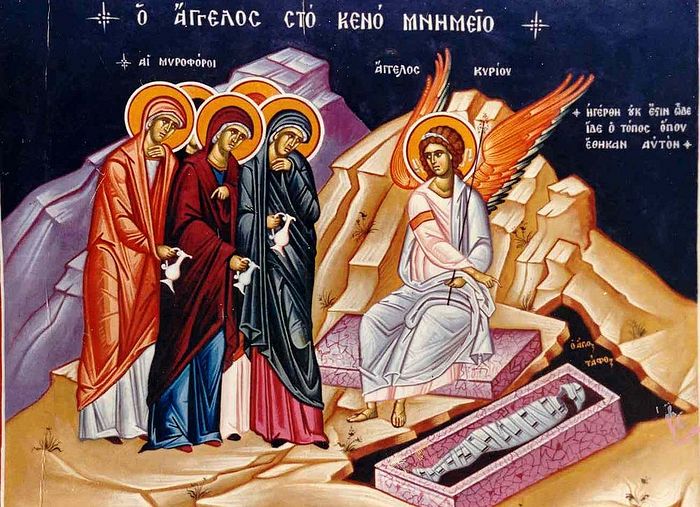 The Holy Myrrhbearers beholding the Angel at the Life-giving, empty Tomb of Christ after His Resurrectio
The Holy Myrrhbearers beholding the Angel at the Life-giving, empty Tomb of Christ after His Resurrectio Now along with the twelve, there was another circle of close disciples of Christ, called “the seventy”, and this is mentioned in the Gospel of Luke. Sometimes we have saints among the seventy, and we say, so-and-so was among the seventy. Also, there were others who were His followers who were apostles, but were not among the twelve, including many women, and we know who some of those women are—the most famous being Mary Magdalene—but other myrrh bearers and close followers of Christ, Joanna and Susana who were among the myrrh bearers. All of these people were apostles, not just the twelve. This is something you have to learn, and when we get to the introduction to the New Testament in our introduction to the Bible course, I will show you precisely in the Bible how the term “apostle” was used in the Early Church. It was not as narrow as the way we use it today. All of these people were apostles. Who was an apostle in the Early Church? Very simply, an apostle was one who was a follower of Christ during His earthly ministry and saw Him alive again after His resurrection. That was the Early Church’s definition of what an apostle was. An apostle was an eyewitness to the Resurrection. That’s why there are no apostles today.
The apostles were extremely important in the Early Church for that reason, because they were eyewitnesses of the Resurrection. What is it that they preached? You see, the reason people think that the Resurrection is not supportable by historical evidence is because they do not really know who the apostles were, or what it is that they preached. What was the Gospel message? What was the evangelio? The Greek word for “Gospel”, “evangelion”, means “good news”. The Gospel was a message; it was not originally a book. The Gospel was a message, “the good news”. When the apostles went out to preach the Gospel, “the good news”, it’s synonymous with what we call the Apostolic kerygma, the apostolic message. I would like to give it to you in a nutshell. I can give you the apostolic message, i.e. the Evangelion, the Gospel in about 5 sentences: “The Messiah has come. It’s Jesus of Nazareth. But He is even greater than what we expected, He’s not only the Messiah but the Lord Himself. He fulfilled all of the prophecies and demonstrated who He was by His remarkable words and deeds. He was crucified, but He rose from the dead, and because of this you too can have eternal life.” There you go, in about 5 sentences. That’s the Gospel. That’s the Evangelion, “the good news”. And the apostles went around the world, they would go to the synagogues that were scattered throughout the Greco-Roman world, hundreds if not thousands of synagogues from one end of the Greco-Roman world to the other. They would go to the synagogues because they were going to the Jews first, and they would say, “I have come to bring you the Evangelion” because they’re speaking in Greek—everyone was speaking Greek then.
“I have come to bring you the good news.” And the Jews in the synagogue would say “great!”—everyone likes to hear good news. “What is it? What’s the news?” And they would say the Messiah has come, it’s Jesus of Nazareth, He was crucified but He rose from the dead and because of this you too need not remain in the grave, you too can have eternal life. That’s the Gospel, it was then and it still is. I can guarantee you that they did not go around the world to these synagogues and say, “listen, I’ve come to bring you the good news, and the good news is that God loves you” or “the good news is you should love your neighbor as yourself.” That is not the Gospel, dear brothers and sisters. The Gospel message at its core is the Resurrection of Christ. That was the message of the apostles, and that’s why they were so important, because they were eyewitnesses of that fact. They would not have been out in the world preaching the Resurrection, preaching the Gospel, if the Resurrection hadn’t happened, because this is what the apostles suffered for, this is what they died for, this is what they lived for, this is what they worked for. They went to their deaths, nearly every single one of them, and I want you to remember that this is more than twelve people. We’re talking about hundreds of eyewitnesses to the Gospel; more than twelve went out and preached—many, many apostles went out and preached, and every one of them went to their deaths insisting on that fact, that Jesus is the Messiah, the Son of God. He was crucified, but He rose from the dead. They left everything they loved, they left their homes and their country, their relatives, their farms and their fields and their fishing boats – everything they knew and they loved. They left all of this behind to live a life of great hardship, great deprivation and suffering for that fact, because they saw Him alive again. Can you imagine what it was like for them to know that the Lord had died and then to see Him standing in front of them and touch Him and see the wounds in His hand and His side? Can you imagine how powerful that experience was? And once they had that experience, they could never deny it. And they went around the world preaching about this. Nothing is more powerful than that message, and that’s why they had to be eyewitnesses to the Resurrection, because that is the core of their teaching. So if anyone questioned them and said, “Oh, come on. Somebody rose from the dead?” they would say, “I saw Him, I touched Him, I ate with Him.”
Now, if you think that life as an apostle glamorous, because we respect them so much, you should think again. If you want to know what the life of the apostles was like, if you want to get a little glimpse of the life of the apostles, you should turn to 2 Corinthians, around chapter 11. See the kinds of things that St. Paul describes were as of his life. Look at 2 Corinthians 11 to see his life as an apostle, the kind of suffering he endured. By the way, when he wrote this letter, he was not at the end of his life. He still had many more years to go, many more sufferings. And earlier in that same epistle Paul describes how the apostles were viewed by the world. Do you remember listening to this particular epistle reading in Church? You should pay attention to the epistle readings dear brothers and sisters; they are so powerful, especially this particular one. As I recall, it is read in autumn, on an autumn Sunday in Church. In this particular epistle reading he talks about how when they are cursed, they bless, etc. And he ends by saying, “We apostles, are the off-scouring of all things, the refuse of the world.” What does that mean? He’s saying that, “We apostles are the garbage of the world,” we’re “the scum of the earth.” That was their life!
Now why am I talking to you about the apostles and the Resurrection? Because people today say “Jesus never really rose from the dead, not in the body. Maybe he rose spiritually, but after His crucifixion, the disciples met together and said: ‘Let’s carry on for Jesus. Let’s try to go ahead and continue His ministry’.” So people today say things like, “He rose in their hearts.” What a sweet idea—but it’s ridiculous! Why would they decide to get together and carry on for Jesus? Carry on what?! What message would they preach? For what purpose? What were they going to go out and preach?! That once there was a Messiah, but He died? What would they preach? That God loves you, that you should love your neighbor? Is that the essence of the Christian message? It is not. That is the Christian ethic, but it’s not the Gospel. Do you know why? Because we’re not saved by that. No one kills you for preaching that God loves you. The apostles didn’t die for insisting that someone should love their neighbor. The apostles died insisting on the Resurrection, insisting that Christ is the Messiah and the Son of God, and nothing would dissuade them from that fact because they had experienced the Resurrection, something so profound that we cannot begin to imagine what that was like. So the apostles, dear brothers and sisters, were eyewitnesses to the Resurrection of Christ.
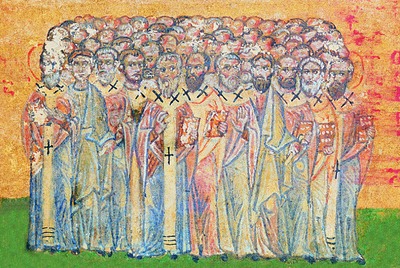 Icon of the Seventy Apostles
Icon of the Seventy Apostles Others say that the apostles simply decided to tell people that Christ rose from the dead and carry on His ministry. I don’t know what kind of ministry it would be, but, first of all, I want to remind you that there were many more than simply twelve apostles. There were hundreds of apostles, and all of these people would have to agree to this charade. But let’s say, for the sake of argument, that there were twelve. If you were among them, would you leave your home and your relatives, your business, your country? Would you leave everything that you held dear to go out and pursue a life of suffering, persecution, imprisonment, beatings, cold, hunger, travel, poverty and martyrdom for a lie? Would you do that for a lie? I wouldn’t! I don’t think you could find twelve people that could do that. Maybe you could find a couple of mentally unbalanced people who would do that, but you couldn’t find hundreds. I don’t think you could even find twelve. So there is something very, very important in the fact that the apostles are the eyewitnesses of the Resurrection. That’s their legacy.
The fact is, dear brothers and sisters, we are left to explain the existence of the Church, because the apostles founded the Church. They lived and they died for the message of the Resurrection. That’s what impelled them, it motivated them, sustained them. They went to their deaths—which were terrible, excruciatingly painful deaths—cheerfully! Insisting that Christ was the Messiah, the Lord, that He rose from the dead and they did not fear death; they welcomed death because they had experienced the Resurrection. The rest of us simply rely on their testimony. I believe the apostles because I can’t explain the existence of Christianity in any other way. Nothing else makes sense to me. And you know what? I am a person who needs some kind of convincing, I’m a lawyer, after all, and I don’t believe things easily; I’m a skeptic at heart. But nothing other than the Resurrection makes sense. The only other option is to believe that they were all liars, that they were all deluded. But what group of people would suffer for the rest of their lives and willingly die a painful death for a lie? I just find that much harder to believe than the Resurrection, which everybody says they need “scientific proof” to believe. To me, believing the apostles is much more credible than not believing them.
So what are the arguments that are raised against belief in the Resurrection, besides the fact that we have to have proof? First of all, let’s discuss that. There are so many things that we accept on the basis of evidence that we are not eyewitnesses to, even scientifically speaking. I’m not a scientist, but I’m sure those of you who are could point out to me many things that we have no direct proof for or we can’t explain, but we accept as true on the basis of evidence, we accept it on the basis of the results which we see.
Let me take a very simple example. You go outside one morning and the ground is wet. You conclude that it rained overnight. There is evidence that it rained; you see that the ground is wet, the driveway is wet, the street is wet, the cars are wet, the trees—everything is wet. Do you have to see the rain falling to believe that it rained? The evidence is all around you. Do we subject everything else to this requirement, that we have to have absolute proof that something happened? Just think about all of the things that you assume to be true because you have evidence of them even though you yourself were not an eyewitness to it. So the Church, the existence of the Church, is evidence enough of the Resurrection, because these people would not have gone to the ends of the earth—“their voices went out through all the earth” (Ps. 19:3)—absent some life shattering event, and that’s the Resurrection, not the Crucifixion. The Crucifixion was the end, the Resurrection was a new beginning. But let’s consider other arguments raised against the Resurrection of Christ.
Most of the arguments have to do with the empty tomb. This is the first detail mentioned in the Resurrection accounts, and it is found in all of the Gospels. The women go to the tomb early on Sunday morning, and they find it empty. Tombs were not holes in the ground like most of the graves today, but tombs were like caves that were hollowed out of a space in a hillside. So a tomb was like a small cave with room inside for more than one body. When they would carve out this tomb, they would carve out a little shelf, or a big shelf, or a niche on which to place someone’s body. And eventually after years had passed and the body had dissolved, the bones would be gathered and placed in an ossuary, which is a small stone box that was used to hold someone’s bones. They still do that, by the way, in many parts of the world, including in Greece; they use the same grave over and over again. About three years after someone has died, they dig up the body and there’s nothing there but the bones. They take the bones out and someone else uses the grave after that. That was the custom throughout the Mediterranean world and at that time during the Roman Empire.
So a tomb was like a cave, and of course we also know that this was a new tomb, and that detail is included in the Resurrection accounts in the Gospels. It was a brand new tomb that had never been used so that there was no confusion. There were no other bodies there; there were no other bones there. A tomb was a rather large room, like a cave that had been hollowed out, and it was closed by rolling a large stone across the opening. The stone was rather large, but it wasn’t a boulder. It was about 4 to 5 feet tall and it was chiseled into the shape of a large, thick coin, so it was flat on two sides and round, and it was placed in a groove; they would chisel out a groove that ran in front of the tomb and then they would place this coin-shaped stone in that groove; they could roll it to the side to open the tomb, then roll it back to close the tomb. So it wasn’t like a boulder. It was easier to move than that, because a boulder is kind of irregular shaped. But still, this stone was very, very heavy, and a woman could not have moved it. You would have needed more than one man even to roll it.
So what do they say about the fact that the tomb is found empty? What do people say to explain the empty tomb? First of all, some people say that Christ didn’t really die, that He fainted or He was very close to death, but after He was laid in the tomb He recovered and came out. Well first of all, all of the accounts, including the Jewish and the Roman accounts, agree that Christ died. If He wasn’t really dead, but just barely alive, when he somehow woke up on Sunday morning He would’ve been extremely weak from a severe scourging and Crucifixion and He wouldn’t have eaten for about three days since Thursday night. How could He, if this was the case, this one man who is practically dead, move the rock away from the tomb which would have weighed hundreds of pounds, especially from inside the tomb? That doesn’t make sense. The Lord really died, everybody agrees that He died, and all of the evidence is that He died. It’s silly and is probably the weakest argument of all that He never really died. He died, and we have of course the Roman soldier who pierced His side with a spear. You know, with someone piercing your heart, I think you’re going to be dead.
The other option that people sometimes raise is that the Jews or the Romans stole the body. Of course they would have no reason to steal the body, and once the idea of the Resurrection started, they would produce the body to refute the Resurrection. Now what’s interesting about this whole thing is that the Jewish authorities fell into their own trap. They were the ones who requested a guard and a seal for the tomb. Both of those things, Pilate granted. They themselves created the proof of the Resurrection, because they were the ones who asked for the guard and the seal, and this is told to us in the Gospel of Matthew. So there is proof of the Resurrection because there were guards there. How do you explain the fact that now the tomb is empty but had been sealed? Also, this tomb was undisturbed when Christ came out of it. Of course, they are the ones who are responsible for providing the assurance of the fact of the Resurrection by having guards there.
The Gospel of Matthew tells us that the Jewish authorities bribed the Roman guards to say the disciples stole the body, and that this story was still being told even at the time that Matthew wrote the Gospel. It is completely plausible that they would be bribed. First of all, they’re in trouble because they were supposed to be guarding the tomb. And why wouldn’t they lie for money? They had nothing to gain by telling the truth. So the soldiers were bribed. They were bought off; but there’s a problem even with their story. First of all, if they are there to guard the tomb, they would be sleeping in shifts. That’s what guards do; they don’t all sleep at once; they would be sleeping in shifts. But let’s say they all fell asleep at once. How could anyone move that large stone without being seen by the guards or being heard by them? Is that possible? We’re talking about a very heavy stone. Someone would’ve heard or seen them. Now remember that the guards said that the disciples came and stole Christ while they were asleep. Well, how would they know that He was stolen by the disciples or by anyone if they were asleep at the time? Does that make sense?
The most popular conspiracy theory is that the disciples stole the body—that’s what the Roman guards and the Jewish leaders were saying. Let’s consider that possibility. What motive would the disciples have for stealing the body of Christ? For what purpose? To perpetuate a fraud? To be responsible for misleading thousands and eventually millions of people? So they could go around the world preaching? Preaching what? Preaching a lie, preaching and dying for a lie? Would the disciples have stolen the body? Let’s consider just rationally what evidence there could be that the disciples would have stolen the body. What argument can be made. First of all, if they ran away simply upon seeing Christ arrested while He was still alive and they believed He was the Messiah. So why would they steal His body now? They were afraid when He was still alive, and they didn’t stand up for Him at that time. Why wouldn’t they be afraid of the soldiers now? Why would they risk stealing Him when He was dead, when they wouldn’t even stand for Him while He was alive? What would they gain from stealing the body? Why would they risk anything for Him now? He said He would rise, right? So if they believed that He would rise, then they would have waited for Him to rise. And if He didn’t rise on His own, then Christ would be a fraud and a liar; and rather than stealing His body to say that He rose, they would be disillusioned, they would feel deceived, they would be angry. So why would they risk anything from their own lives, especially their freedom, to steal the body of a deceiver who said that He would rise, but didn’t? Does that make sense to you? It surely doesn’t make sense to me.
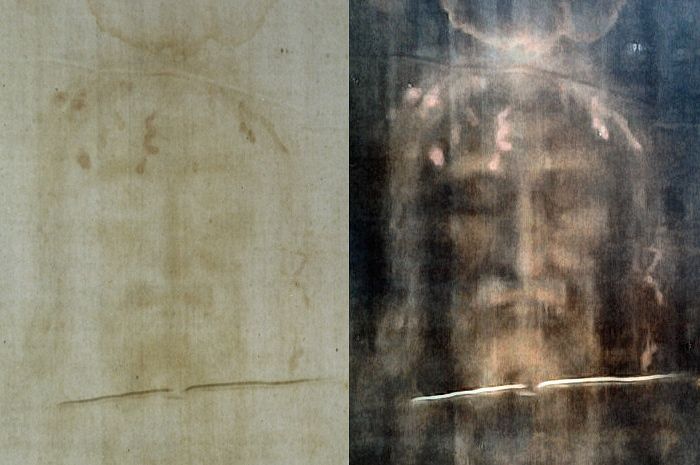 The Shroud of Turin: modern photo of the face, positive left, digitally processed image right
The Shroud of Turin: modern photo of the face, positive left, digitally processed image right Now there’s another important detail in the Resurrection accounts that is mentioned in the Gospels, and that is the fact that the burial cloths were found at the tomb. This is mentioned more than once for a very important reason; it is another proof of the Resurrection. If the disciples or anyone else did steal the body, why would they unwrap Him? It would’ve taken too much time and would have been too difficult. And why would they do it anyhow? Because then they would be carrying a messy, battered up body. Does that make sense? That they would take off the burial clothes? That does not make sense. Furthermore, it would have been extremely difficult if not impossible to remove the cloths, because when they wrapped the Lord, He was covered with all kinds of wounds and blood. And the blood would have stuck to the cloths. The wounds would have stuck to the burial cloth, and also the myrrh and aloes that were put on the body would have stuck to the cloth. Remember what it was like when you were young and your mother would put some bandage on your wound—now they have the non-stick kind of Band-Aids. But when I was a kid, it would stick to the wound and sometimes when they take it off the scab would come off with it and you would start bleeding all over again, remember that? There was no non-stick burial cloth. It would have stuck to the body, and the fact that they find the burial cloth there is so important, because it means that Christ rose. He left it behind. He didn’t need it anymore. You see, if it had been stolen, nobody would have left it behind. So you see, Christ did die, and the body was not stolen.
Now we have to address the matter of the Resurrection appearances. How do people explain that away —because he’s appeared to various disciples? Well, they say two things. First they might say that what the disciples saw was a ghost. In the beginning, they thought they were seeing a ghost because they knew He had died. But, first of all, we know it was not a ghost because all of the Resurrection appearances mention the physical nature of the appearance: They touched Christ, they saw Him eat a piece of fish, they sat down together on more than one occasion and shared a meal. Ghosts can’t do that; that’s not a ghost.
The other thing that people say is that the disciples were hallucinating. They wanted so badly to believe that He was alive again; they intensely wanted to believe that Christ rose. But this also does not comport with what we know from the Gospels. The Gospels tell us that rather than intensely wanting to believe Christ rose, they disbelieved. Look at the Gospel of Luke. We don’t read this particular appearance often, but it’s so important. The Eleven disbelieved the women. The women came to where the eleven disciples were hiding and they said “We have seen the Lord! And they didn’t believe them. By the way, one reason why they didn’t believe them: I told you about this in the trial—women were not considered trustworthy witnesses. I love that, because they’re the first witnesses of the Resurrection. And you know when we talk about how you have to believe on the basis of faith, I think this is one reason why Christ first appeared to the women—because we have to believe on the basis of faith, and women were not considered believable, they were not permitted to testify in court. So, the disciples, don’t believe them.
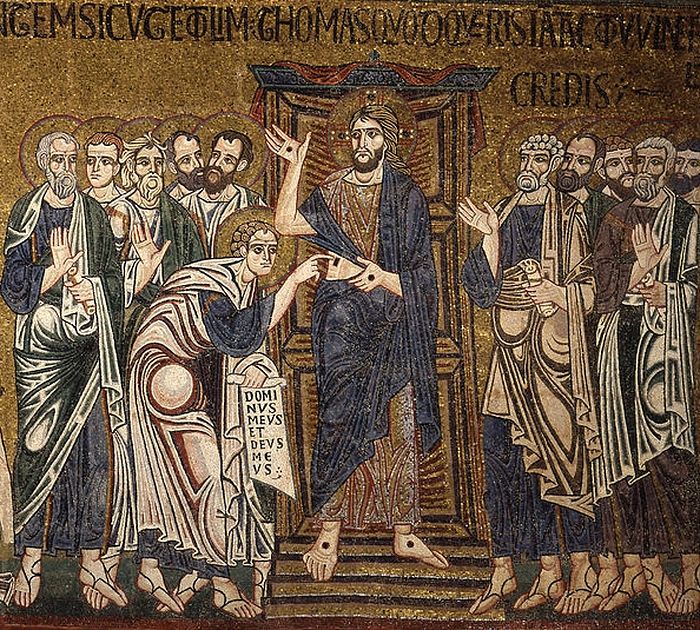 Basilica di San Marco. North side, lower register, narrative cycles of Jesus Christ appearing to the Holy Women and the Incredulity of Thomas
Basilica di San Marco. North side, lower register, narrative cycles of Jesus Christ appearing to the Holy Women and the Incredulity of Thomas And soon after that it tells us Christ appeared in the room standing in front of them, and still they didn’t believe! They thought it was a ghost! He had to ask for a piece of fish to prove that He was for real, that’s in the Gospel of Luke. Thomas was not the only one who had trouble believing in the Resurrection—he’s discussed in the Gospel of John. And as far as hallucination goes, there were too many of these appearances to too many people in different places over a period of 40 days. They couldn’t all have been hallucinating, they couldn’t all have had such an imagination, such a strong desire to believe that Christ rose that they all imagined the same thing. And they certainly didn’t all collaborate in perpetrating a lie.
So all of this takes us back to the question of why anyone would insist on the physical reality of the Resurrection of Christ, to the point of living a life of terrible deprivation, imprisonment, hardship and a death as a martyr for a lie. We’re left making a decision. We have a decision to make. Either the Resurrection is true, or it’s the greatest fraud ever perpetrated on mankind. So we will continue this discussion about the Resurrection next time. We’ll talk about the various Resurrection appearances, first to the women then to others. We’ll talk about what we learn about the resurrected body from these appearances. We’ll talk about the three-day terminology, why we say He was in the tomb for three days, the meaning of some of the images and the icon of the Resurrection, and we will examine carefully the earliest written account of the Resurrection. And rather than ending with our usual prayer, let’s end with the Resurrection apolytikion: Christ is Risen from the dead, trampling down death by death, and upon those in the tombs bestowing life. Amen. Truly the Lord is Risen!
Presbytera and Dr. Jeannie Constantinou’s podcasts can be found here.
